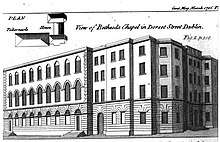Bethesda Chapel, Dublin
The Bethesda Chapel, Dublin, was a Episcopal Church of Ireland, church on Granby Row and Dorset Street, Dublin.[1]

History
The Bethesda chapel was founded by Dublin Merchant William Smyth, nephew of the Bishop of the same name, in 1784. Its development was part of the evangelical movement in the Church of Ireland.[2] It did not get episcopal recognition until 1825.[3]
The Bethesda Chapel was sometimes known as the Bethesda Mission, or the Bethesda Episcopal church. The chapel was burned down after a great storm in January 1839: a new chapel was built on the site, designed by Frederick Darley and opened in December 1840. The Bethesda Female Orphan School at 23 Upper Dorset Street was affiliated to the Chapel from 1787. In 1794, the Lock Penitentiary was opened by Mr. Walker: it housed females leaving Lock Hospital: as a result, it was sometimes called Locks Chapel. The penitentiary or asylum was funded by benefactors and by church collections; also its inmates made a living washing and mangling clothes.[4] Arthur Guinness and his wife served on the governing committee of the Penitentiary, as did J.D. La Touche.
Founder of Methodism, John Wesley preached at the Chapel on a number of occasions in April 1787, during his tour of Ireland.[5]
Following the death of William Smyth, the control of the Chapel was passed in 1794 to a board of five trustees, all members of the clergy.
Chaplains to the Chapel, included Rev. Edward Smyth (Brother of founder William Smyth, who was a friend of John Wesley and perceived as a Methodist though he had been expelled from his position in Ballycutter in the Derry Diocese), Rev. William Mann, Rev. John Walker from 1793 until 1804 (a dissident who left to found The Church of God),[6] gave the Chapel a more Calvinistic ethos, other ministers at the church were Rev. Henry Maturin, Rev. Benjamin Williams Mathias (pastor from 1805 until 1835), John Gregg (future Bishop of Cork; chaplain from 1835 until 1839), the noted preacher Rev. William Henry Krause (from 1840 until his death in 1852; many of his sermons were published after his death)[7],Rev. John Alcock AM, (chaplain from 1852 to 1866).[8] and Rev. Charles H. H. Wright, D.D. In 1878, Rev. Ambrose Wellesley Leet D.D. was appointed to the Bethesda Church, Dublin. The evangelical hymn-writer Thomas Kelly was a trustee and preached at Bethesda.
Bethesda ceased to be a Chapel and secularised in 1908, and in 1910 it was converted into a Cinema, under various names: Shanleys Picture Hall, The Dorset Picture Hall and The Plaza Cinema.[9] It got a major facelift in the 1960s and in 1981 it closed as a cinema and became the National Waxworks museum, owned by former TD and Senator Donie Cassidy. The site was demolished in 2005 and was redeveloped as a hotel.[1]
References
- Bethesda Chapel, Granby Row, Dublin
- Carter, Grayson (2015). "Anglican Evangelicals: Protestant Secessions from the Via Media, c. 1800 - 1850". Wipf and Stock Publishers.
- Acheson, Alan. "Revival in the Irish church" (PDF).
- Lock Penitentiary - An historical guide to the city of Dublin, illustrated by engravings, and a plan of the city by George Newenham Wright, Baldwin, Cradock, and Joy, 1825
- 'The Life and Times of Selina Countess of Huntington', By a Member of the Houses of Shirley and Hastings, Volume 2.
- Rev. John Walker Oxford Dictionary of Irish Biography.
- Lectures Delivered in Bethesda Chapel, Dublin, Volume 1, 2 and 3, by William Henry Krause.
- "Guinness's Brewery in the Irish Economy 1759–1876" Lynch, P; Vaizey, J. p103 Cambridge, CUP, 1960
- The Plaza Picture Palace, Dorset Street, Granby Row, 1968 www.dublincity.ie